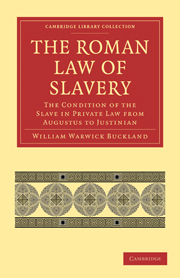Book contents
- Frontmatter
- PREFACE
- Contents
- ERRATA, ADDENDA, AND LIST OF ABBREVIATIONS
- LIST OF PRINCIPAL ABBREVIATIONS
- PART I CONDITION OF THE SLAVE
- PART II ENSLAVEMENT AND RELEASE FROM SLAVERY
- APPENDIX I The relation of the contractual actions adiectitiae qualitatis to the Theory of Representation
- APPENDIX II Formulation and Litis Consumptio in the actions adiectitiae qualitatis
- APPENDIX III Form used by Slave in acquisition by Mancipatio, etc.
- APPENDIX IV The essential character of Manumission: Iteratio
- APPENDIX V Manumission vindicta by a, filiusfamilias
- INDEX
APPENDIX II - Formulation and Litis Consumptio in the actions adiectitiae qualitatis
Published online by Cambridge University Press: 07 September 2010
- Frontmatter
- PREFACE
- Contents
- ERRATA, ADDENDA, AND LIST OF ABBREVIATIONS
- LIST OF PRINCIPAL ABBREVIATIONS
- PART I CONDITION OF THE SLAVE
- PART II ENSLAVEMENT AND RELEASE FROM SLAVERY
- APPENDIX I The relation of the contractual actions adiectitiae qualitatis to the Theory of Representation
- APPENDIX II Formulation and Litis Consumptio in the actions adiectitiae qualitatis
- APPENDIX III Form used by Slave in acquisition by Mancipatio, etc.
- APPENDIX IV The essential character of Manumission: Iteratio
- APPENDIX V Manumission vindicta by a, filiusfamilias
- INDEX
Summary
These intimately connected topics have been the subject of much controversy in recent years. No generally accepted solution of all the problems has been produced. In the following paragraphs space allows of no more than a general account of the matter.
The most accepted view as to formulation is that of Keller. He holds that in the actio de peculio the intentio was in ius, with a fiction of liberty where the contract was by a slave, and assuming of course that the claim is one which ordinarily gave an intentio in ius. This view is adopted with new argument by Lenel. For ordinary formulae in ius the suggested form is the simplest way in which to raise the issue, all that is needed being a change of name in the condemnatio, and the fiction of liberty in the case of a slave. It is clear on the texts that there was a fiction of liberty, and this would not be needed in a formula in factum. And a text dealing with the novation of the obligation strongly suggests that the intentio was in ius. But the chief argument is the ipso iure consumptio which appears in some of the texts.
The intentio thus framed, stating the transaction between the parties, brings into issue the whole obligation, but we know that the defendant could not be condemned beyond the extent of the peculium and any versio. It is not quite clear how this restriction was expressed in the formula.
- Type
- Chapter
- Information
- The Roman Law of SlaveryThe Condition of the Slave in Private Law from Augustus to Justinian, pp. 706 - 711Publisher: Cambridge University PressPrint publication year: 2010First published in: 1908



